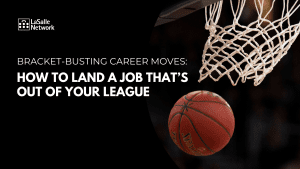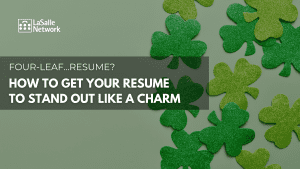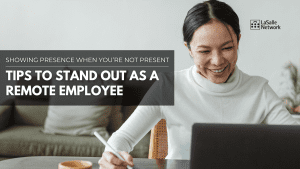For the graduating class of 2020, the job search for their first position out of college is now coinciding with a sudden and severe increase in unemployment due to the Coronavirus pandemic. We hosted a webinar providing resources and insight for these student’s job hunting during a recession. To view the webinar recording, click here.
Below are the answers to the questions we received during the webinar in the hopes that they will help as you approach your job search.
With a lot of companies on a hiring freeze, do you have any insight on when they might unfreeze?
No one knows exactly when hiring will pick back up. Our optimistic educated guess would be mid to late in the second quarter.
Do you recommend reaching out to a recruiter or hiring manager on LinkedIn after applying for a position?
Yes. If you write an appropriate and thoughtful message targeted to the correct person, that can go a long way in showing genuine interest.
How long should I wait to follow up after an interview? What kind of language should I use to show interest and patience?
Follow up after the initial interview as soon as you can, even the same day, to say thank you and affirm your interest in the position.
Approach the follow up with empathy, telling the interviewer that you understand they have a lot going on right now and you understand it may not be possible for them to follow up with you immediately. Express your interest and excitement in the opportunity and that you look forward to hearing from them.
If you follow up again a week or so later, reiterate that you understand they are very busy as you ask for updates. A tone of empathy and understanding is important.
What should I do if I was in the middle of the interview process when the company went into a hiring freeze? How often should I reach out to check up on the process?
You can check in every few weeks or so with a short, well written message that expresses empathy for the situation at hand. Make sure to mention that you understand they are in a hiring freeze, then express that you are still interested in the position and look forward to hearing any updates when the time comes.
If I am interviewing and do not have all the job qualifications, how should I address it?
It is likely that an interviewer will be able to figure out throughout the course of your conversation if you are not being fully honest, so being forthright with them is important. Before your interview, think through the aspects of your experience that may be able to offset the requirements you lack and be prepared to articulate that. Come up with a plan of how you could get up to speed in that particular area and share that with you interviewer.
What are guidelines for setting a start date? Can I request a later date?
It depends on your reasoning. If not explained, a candidate asking for a later start date can cause concern on the company’s end. They may think that you are hesitant to take the job or waiting on other job offers. Accepting a job closer to your graduation date shows that you are excited and eager to start your career.
What do you suggest doing if I apply to a company and there is no direct contact information to reach out to the recruiter?
There may not be a way to get it 100% right, but that’s ok! You could call the company and speak to the receptionist to learn who might be the person to contact. Otherwise, look on their LinkedIn company page to find senior employees with human resources, recruiter or talent acquisition in their title. Even if they may not be the exact right person, they typically can connect you.
What are some tips for a stand-out resume?
The top of your resume should include your education and relevant certifications, then going into any experience you’ve had and ending with additional skills.
Do not include an objective, because they often can be either too vague or too specific for a role to provide value.
Do not include hobbies. While they may be interesting, they do not necessarily belong on a professional resume.
Where should I place certifications on my resume?
Certifications can either be placed in the education section, or at the very bottom of your resume.
Any tips for a stand-out LinkedIn Page and Profile Statement?
Make sure you have a professional looking headshot of just you. Update your experience with all relevant jobs and internships with a few bullet points describing your responsibilities. Your ‘About’ section should be well written, checked for spelling and grammar, and highlight a few of your key strengths. Don’t focus on just your past experience, but on what you can bring to a prospective employer.
When should I include a cover letter? What should I include in it?
You likely will not be faulted for including a well written cover letter, even if it is not necessary. We are seeing cover letters become less and less of a requirement, however, a well written cover letter that explains exactly why you are interested in the role and company can go a long way in setting you apart. Pay close attention to if a cover letter is requested and provide it when it is, but always make sure it is personalized and grammatically correct.
I’ve been applying to entry level jobs and talking to people on LinkedIn directly about some positions since January. Almost everyone has gotten back to me with a no. What’s my problem?
See if you are able to connect with a recruiter or career services professional that specializes in your target industry. They can give you direct feedback on what interviewers are looking for, jobs to consider and suggest adjustments to your resume, if necessary.
If I decide to take a role that is in a different sector than my intended career path, will I have a hard time jumping back over and reaching that intended path in the long run?
If you’re taking a part–time or contract role, employers will recognize that it may not have been the intended career path and will not necessarily think that the industry or role is what you are targeting moving forward.
If it is a full time, direct hire position, consider how the role may relate to your long-term career ambitions. Even if a role does not look exactly how you imagined your first career out of college to be, it may have elements of roles you would consider in the future or allow for you to build on transferable skills.
What should I do if what I studied isn’t the kinds of jobs that are hiring?
Your experience isn’t necessarily limited to what you majored in. Think of the skills you acquired in your classes, internships or jobs and leverage those experiences.
Will temporary or part–time jobs provide health care?
At LaSalle Network, we do offer temporary employees benefits if they are work a certain length of time and number of hours. Many other staffing firms do offer this as well, but it is something you should check on in a case by case basis.
How should international students handle their job search and visa questions?
International students should begin their job search as early as possible, as their job search may take a bit longer. Consider connecting with other international students in your network to hear what companies they have had success with, as companies who have hired international students in the past are more likely to do so again.
Regarding citizenship, employers may ask “are you legally authorized to work in the United States and will you now or in the future require sponsorship for an employment visa status?” Be sure to be honest on applications and with interviewers.
I applied to two graduate schools but am pending acceptance. When should I start to shift more towards finding temporary work in case they don’t accept me?
It is a good idea to investigate temporary work options if unsure of graduate school plans, especially if there are temporary work options relating to your field of study. Contract work can help to avoid a large gap in a resume.
When considering going back to school, consider if it is financially doable for you at this time and if the program will help you in your long-term career goals.
For more information, download the full webinar recording here.





